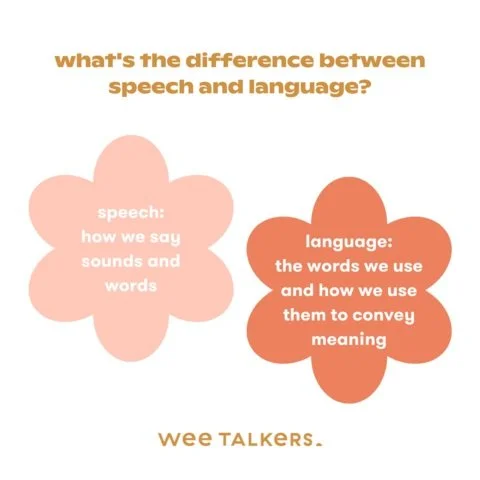Does Tongue-Tie Affect Speech & Language Development?
These days, it seems like everybody’s talking about tongue ties! It comes up a lot on Instagram and with our friends. But how does tongue-tie affect talking in our little ones? In this post, we cover what tongue ties are, how tongue-tie affects speech and language development, whether or not a release will help, and how to decide if a release is right for your child.
Let’s talk tongue ties!
What Is Tongue-Tie?
According to ASHA Wire, a tongue tie—also called “tongue-tie” or, more formally, ankyloglossia—is defined as:
“A common congenital anomaly that is usually detected soon after birth. It is characterized by partial fusion-or in rare cases, total fusion of the tongue to the floor of the mouth due to an abnormality of the lingual frenulum.”
More simply put, we all have tissue that attaches our tongues to the bottom of our mouths. That tissue is called the lingual frenulum. But some children are born with a lingual frenulum that’s much shorter, thicker, or tighter—a tongue tie! In itself, that tongue tie isn’t particularly harmful or bad, but it can, in some cases, make things like feeding, sleeping, and possibly talking harder. If that’s happening, a qualified professional will sometimes recommend minor surgery to “revise” or “release” the lingual frenulum.
Image Source: Mayo Clinic
How Common Are Tongue Ties?
It seems like tongue ties are more common these days, doesn’t it? Maybe that’s due to increased public awareness around tongue ties and the difficulty they can cause. Maybe it’s because tongue-tie support is becoming more available, so it’s easier to address them. Or maybe it truly has just become common (Did you know tongue ties are genetic?). But in reality, only about 4% of newborns have tongue ties.
I (Katie) once worked with an ENT who told me that while in his residency back in the day, the attending physician carried surgical scissors in his pocket. Then, when he was in the nursery, if he saw a tongue tie, he would just clip it—without even talking to the parents. (Can you even imagine?!) This ENT’s point is that it’s hard to know if it’s truly more common now, because a while back, parents might not have ever found out about their children’s tongue ties!
How Tongue Ties Affect Development Overall
Whatever the origin of your child’s tongue-tie, you’re probably reading this post because you’re curious about how it might impact their overall development. And kudos to you for being here and reading about it for their benefit. We know there are so many little things you do each day for your child that go unnoticed. Consider this one noticed by us!
The way tongue-tie affects development is a really interesting topic and one that’s hard to sum up with one big blanket statement like, “If your child has a tongue-tie, they will always X or never Y!” (Thankfully, we don’t like blanket statements like that very much, anyway!)
Tongue-tie restrictions have so many variables to them. Some adults have visible, tight tongue ties, did just fine feeding as infants, and never needed speech therapy in their school-aged years. Some adults have seemingly minor tongue ties and experience things like mouth breathing, headaches, poor posture, and sleep apnea because of them. When it comes to your child’s development, tongue-tie isn’t a guarantee of anything. But, we know that’s not a super-satisfying answer! So since the ways tongue-tie affects speech and development aren’t super clear, let’s start with what we do know.
#1 Speech & Language Are Two Separate Things
First, we know that even though speech and language are often talked about like two sides of the same coin or a package deal, they are two very separate things.
Speech refers to how we say sounds and words. It’s the actual, physical element of moving and coordinating the lips, teeth, tongue, jaw, vocal cords, and palate to produce spoken words. According to the American Speech-Language-Hearing Association (ASHA), speech includes articulation, voice, and fluency.
Language, on the other hand, is the words we use, and how we use them to convey meaning.
According to ASHA, language includes what words mean, how to make new words, how to put words together, and what we should say at different times. Language does not have to be spoken either, so other types of communication, like sign language, all count here.
Learn More: The Difference Between Speech & Language
#2 Tongue-Tie Does Not Affect Language Development
We also know that tongue-tie does NOT affect children's language development. That means your child’s ability to understand communication and express their wants, needs, thoughts, and ideas will not be negatively affected by a tongue tie. It also means that if they’re a late talker, you can rule out tongue-tie as a potential cause.
#3 Tongue-Tie Can Affect Development
Research has shown that a tight, restricted frenulum (where the tongue-tie happens), can lead to difficulty breastfeeding, poor sleep, mouth breathing, reflux, and an overall forward posture. This 2018 study also found that 5 children who had a tongue tie release went on to have improved lingual (tongue) mobility, which improved their speech and feeding skills. But whether or not a release is the best course of action is heavily debated!
How Tongue-Tie Affects Speech & Articulation
When it comes to the ways that tongue-tie affects speech development, there’s one element that’s highly disputed among professionals: articulation development, or the way your child pronounces certain speech sounds.
Some studies and professionals suggest that because tongue-tie limits tongue mobility, it will affect articulation. (Imagine if you had difficulty lifting your tongue to the roof of your mouth to make the /t/ sound. That’s the point they’re trying to make!) If that’s the case, it seems like a pretty reasonable conclusion that a release would help with articulation and speech!
But while some studies and professionals suggest that tongue-tie restricts tongue mobility, it’s important to remember that our tongue actually requires very little movement to say speech sounds! So the bottom line is that, right now, we don’t have enough research to support this idea.
The Research on Releasing Tongue-Tie
Research-wise, we don’t have enough evidence to show that a child’s ability to pronounce speech sounds is affected by their tongue tie. We also can’t prove that releasing the tongue tie will improve your child’s articulation.
Because the evidence we have now doesn’t support a correlation between tongue-tie revisions and improved articulation skills, we do not recommend releasing your child’s tongue tie just to prevent potential future problems. To put it really plainly, there’s just no guarantee that tongue-tie release surgery (also called a frenectomy) will make a difference.
That said, even though we don’t have sufficient research showing that releasing a tongue-tie is going to help your child, there are plenty of knowledgeable professionals who would claim otherwise based on experiences they’ve had. Many medical and development professionals have seen cases where releasing a tongue tie has had positive benefits for a child’s articulation skills because after the release, they could move their tongues more quickly and effortlessly. This can help children better produce speech sounds, which makes them easier to understand.
We’ve witnessed this in some cases as well!
Katie’s Experience With Tongue-Tie & Release
All four of my (Katie’s) kids have or have had tongue ties. (Remember, it’s genetic!) So naturally, I poured over the ever-changing research to decide on what to do. In my case, because of feeding difficulties and reflux in infancy, every one of my kids had their tongue tie revised—but each at different ages, using different methods. (Surgical scissors, laser revision, diode laser, CO2 laser, follow-up stretches vs. no stretches…we’ve done it all!)
Unfortunately, not one of my children’s feeding skills improved dramatically afterward, and their reflux persisted every time. But, it did help by decreasing mouth breathing. And when it comes to sleep, who knows? 😂 They all had trouble figuring out sleep as newborns, but they’re doing great now! Also, one child had his lip tie and tongue tie clipped, and I will say that brushing his teeth is worlds easier than it is with the other kids! Again, there are so many variables here, but in most of the cases, I’m glad I did it!
(One note I’d make here is that if I were to do it again, I would most definitely include a myofunctional therapist on my child’s team post-tongue-tie release. We didn’t do this for any of my kids but knowing what the research says about it now, I would if I were you!)
How To Decide If You Should Release Your Child’s Tongue-Tie
Before making a decision about whether or not to release your child’s tongue tie, make sure that you’ve got the right information on their diagnosis. We recommend seeking advice from a professional with continuing education and the qualifications to properly diagnose tongue-tie. That means talking to a:
Speech-Language Pathologist
Ear, Nose & Throat Physician (ENT)
Occupational Therapist
Lactation Consultant
Dentist
Physical Therapist (in some cases)
Pediatrician
Myofunctional Therapist
Then, once you’re sure you have an accurate diagnosis, consider this question: How is my child’s tongue tie impacting their quality of life? If your pediatrician pointed it out, but your child is feeding fine and gaining weight adequately, it might not be worth addressing. On the other hand, if they have bad reflux, feeding is painful or difficult, and you think it might lead to a more positive feeding experience, it could be right for your child and your family.
Our Advice: Don’t Google or Compare
For how common they seem to be these days, tongue ties are not the same for every child. So, unfortunately, a quick Google search won’t give you a perfect diagnosis, prognosis, or path forward. Even certain professionals within the development field may have conflicting opinions. This can make it really hard to know what to do as a parent. (Isn’t it always?!)
The best thing to do is talk to a qualified professional you trust about your individual child, then make the choice that’s best for your family. Trust yourself, too. You know what’s best for your child and your concerns are always valid, so bring up any you have with your pediatrician or another trusted, qualified person on your child’s care team.
Support Their Speech & Language Development At Home
Worried about your child’s speech development? Want to be as proactive as you can at home? We’ve got some free resources that will help you take the right next steps!
Baby Bundle
For parents of babies 0-12 months, this resource bundle gives you plenty of ways to support your baby’s language development during the first year—a critical opportunity for development!
Toddler Milestones
For parents of toddlers, we recommend downloading our toddler milestone checklist! It’ll let you follow along with and support your child’s communication development as they grow.
References
A Study on the Genetic Inheritance of Ankyloglossia Based on Pedigree Analysis. (Han, Kim, Choi, Lim & Han, 2012)
Speech and Feeding Improvements in Children After Posterior Tongue-Tie Release: A Case Series. (Baxter & Hughes, 2018)
Myofunctional Therapy to Treat Obstructive Sleep Apnea: A Systematic Review and Meta-Analysis. (Camacho et al., 2015)
Talking Tongue Tie: Do Tongue Ties Affect Speech? (The Informed SLP, 2020)
Orofacial Myofunctional Disorders (American Speech-Language-Hearing Association, accessed April 17th, 2022)



